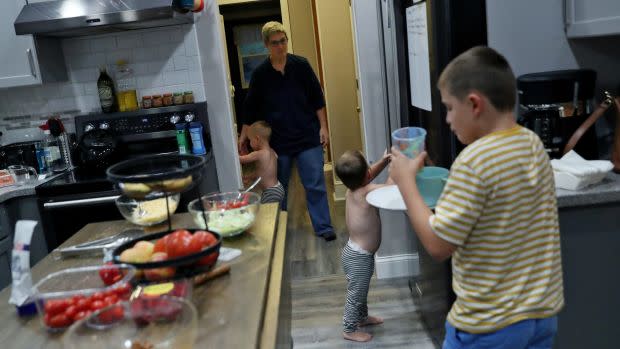Biden’s plan would revolutionize American family life
- Oops!Something went wrong.Please try again later.

President Joe Biden released his American Families Plan today, a $1.8 trillion package that promises nothing short of rewriting the US’s social contract.
If passed, it would insert the government into parts of American life that politicians before him have purposefully avoided, from workplace leave policies to the cost of daycare.
“The US has had a rugged individualism ethos of pull-yourself-up-by-the-bootstraps,” says C. Nicole Mason, president and CEO of the Institute for Women’s Policy Research. “What this plan says is ‘That’s not who we are. The government does have a role to play here.’”
The plan, which Biden expanded on during his first congressional address tonight, reflects Americans’ perennial juggle between work and family—and a newfound, pandemic-induced urgency to ease it. It includes a paid family and medical leave program, the first ever to be introduced by a president, and billions of dollars to cover household expenses, such as food, childcare, and healthcare.
Activists and experts who have long fought for more generous family policies were impressed with the scope and budget of the proposal, an unusual situation for those in their line of advocacy. Mason deemed it “a game-changer,” while AFL-CIO secretary-treasurer Liz Shuler called it “the right plan at the right time.” Neil Sroka, a spokesperson for the PL+US: Paid Leave for the United States, said it would “fundamentally transform the way we live and work in the US.”
“A revolutionary investment in the economic trajectory of the country,” said Alix Gould-Werth, an expert at the Washington Center for Equitable Growth.
What is in the American Families Plan?
The administration is yet to release the full details, but here is a breakdown of the policy changes it’s proposing, along with their price tags when available.
A plan that matches the problem
The plan targets the parts of the American family budget that have been thrown out of whack over the last couple of decades. Prices for education, medical care, and childcare, in particular, have jumped dramatically in that period, outpacing other expenses such as housing and transportation—and wages.
The government had mostly taken a hands-off approach to the budget squeeze, regardless of the party in the White House, experts say, but the pandemic is forcing a shift. “The last year has made it very obvious that American families don’t have the support or the resources they need both to provide for their families financially and also deal with caregiving responsibilities,” says Vasu Reddy, senior policy counsel at the National Partnership for Women and Families. “Especially for the lowest paid workers, especially for people of color, for people in essential jobs, it is really difficult, if not impossible to meet both of those needs.”
The plan would patch up family finances in several ways. It would lower childcare bills through aid and preschool education, and liberate caregivers from choosing between getting a paycheck and nurturing a sick relative via the paid family and medical leave program.
In the long-term, it would improve families’ prospects by giving young people a leg up in securing good-paying jobs that require a college education.“If the cost of college is $50,000 a year at a four-year institution, by doing two years of community college, you’ve saved $100,000,” says Mason.
The American Families Plan’s economic impact
As unprecedented as it is, Biden’s plan is in some ways playing catch-up to how things are done not only in other countries, but in some US states.
For example, eight states and Washington DC already have paid family and medical leave programs. Some employers have also been advocating for it—250 of them, including Salesforce, Spotify, and Levi Strauss & Co., recently signed a letter asking Congress to pass paid leave, calling it “one of the critical solutions to our nation’s economic recovery.”
Some states and cities have been implementing universal pre-school, too, and business trade groups often frame it as a workforce issue. “This is how they grow into productive people as adults,” says Gould-Werth of early education. “That is a very smart economic investment, in addition to all the other reasons we might want to invest in young children.”
In addition to family life, Biden’s plan has the potential to revolutionize the entire economy. It’s bound to resonate with both companies and workers, beleaguered by months of pandemic work-life balance. It’s unclear, though, whether a divided Congress will feel the same.
Sign up for the Quartz Daily Brief, our free daily newsletter with the world’s most important and interesting news.
More stories from Quartz:
